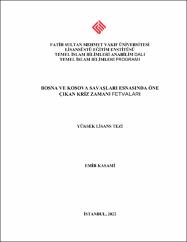Bosna ve Kosova Savaşları Esnasında Öne Çıkan Kriz Zamanı Fetvaları
Künye
KASAMİ, Emir, Bosna ve Kosova Savaşları Esnasında Öne Çıkan Kriz Zamanı Fetvaları, Fatih Sultan Mehmet Vakıf Üniversitesi Lisansüstü Eğitim Enstitüsü Temel İslam Bilimleri Anabilim Dalı Temel İslam Bilimleri Programı, Yayımlanmamış Yüksek Lisans Tezi, İstanbul 2023.Özet
Balkan coğrafyasının önemli iki ülkesi olan Bosna Hersek'te 1992-1995 ve
Kosova’da 1998-1999 yılları arasında bölgenin çoğunluk nüfusunu oluşturan
Müslümanlara yönelik tüm dünyanın şahit olduğu iki savaş yaşandı. Savaştan daha ziyade
toplu bir kıyım hüviyetindeki bu katliamlarda bölge Müslümanlarının yaşadığı dini,
hukuki, siyasi, sosyal, ekonomik pek çok kriz/olağanüstü durum cereyan etti. Başta
Balkan coğrafyasının alimleri olmak üzere birçok alim ve kanaat önderi, savaş sebebiyle
gündem olan zor zaman meselelerine cevap bulmak için gayret sarf ettiler.
Bu çalışma, belirtilen zaman aralığında ve coğrafyada savaşın oluşturduğu
koşullara yanıt olarak ortaya çıkan fıkhî üretimin tespitini arka planı ile birlikte ortaya
koymaktadır. Netice, canlı ve dinamik bir ilim olan fıkhın sorun çözmedeki ve toplumsal
hareketlilik ve değişimdeki konumunu belirgin bir şekilde ifade etmektedir. Between the years of 1992- 1995 and 1998 – 1999 the countries of bosnia
herzegovina and Kosovo respectively went through war, these two geographically
important countries in Balkan area with a population of which the majority is Muslim,
went through wars that the whole world witnessed. In these massacres, which were more
like a mass murder, Muslims went through religious, judicial, political, social and
economic crisis. A lot of effort was made by worldwide scholars and Balkan scholars as
well to find answers for the difficult consequences that were part of the war agenda. These
wars that took part at the end of twentieth century, were an important breaking point for
both world history and Muslims in particular. As it pertains to the questions, problems,
and the fatwas that emerged during the process no academic study is to be found upon
that. This sort of work, scattered historical data, especially from the perspective of fiqh
will give a complete meaning to the issue. The discussions that took part during the
process of the war, of which the effects are still present will contribute a lot to the field of
social research. Fiqh as a living and dynamic science will clearly disclose its position
toward problem solving in social mobility as well as change. During a long period of
emergency, the scholars' fiqh solutions will make a valuable contribution to the literature
for the questions that pertain to all areas of life of the Muslims of the region and the
questions that may not have been on the agenda before. According to these reasons, the
chosen topic on this thesis will have importance and originality.



















